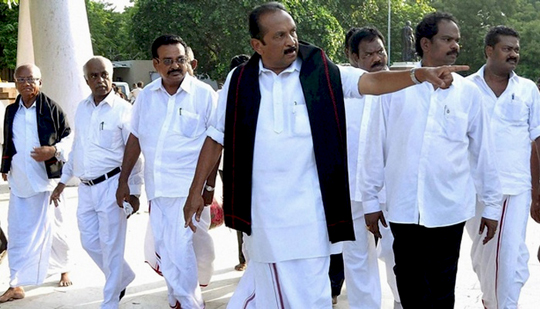Madurai, Mar 26: MDMK leader Vaiko on Friday alleged that the DMK and BJP had made offers, including money, to DMDK leader Vijayakant, who had rejected them to join the People's Welfare Front (PWF) to fight the coming Assembly elections in Tamil Nadu.
Talking to reporters here, he claimed the DMK had "offered" 80 (assembly) seats and Rs 500 crore to Vijayakant for joining its alliance while BJP had offered him a Rajya Sabha MP post and a ministerial berth in the union cabinet."
"Vijayakant has joined us to form a corruption-free government in Tamil Nadu by rejecting the offers. Vijayakant has created the confidence that he will provide a corruption- free government. Vijayakant has rejected the offer of corruption money by DMK to form a corruption-free government," Vaiko said.
Reacting to the charge, DMK Treasurer M K Stalin said the party would take appropriate legal action in the matter.
"In the first place no talks were held (between DMK and DMDK). How come such a thing could have happened when parleys did not take place," he said.
"Premalatha has replied to this allegation. Still, since Vaiko has levelled a blatantly denigrative charge against the DMK. Our party chief Kalaignar (Karunanidhi) would, for sure, take appropriate legal action. Wait and see," Stalin told reporters in reply to questions on the issue.
DMDK leader and Vijayakant's wife Premalatha refused to be drawn into the controversy.
"It is his (Vaiko) opinion. Anything (questions) related to this should be posed to him, we are committed to unseating the AIADMK regime," she told reporters in Tuticorin.
Stating that one crore youth population who had joined the voters list, wanted a liquor and corruption-free state, Vaiko said, "We are getting more support on the social media."
The first election meeting of the PWF will be held in Chennai on April 20.
Vaiko said quality education would be provided free of cost, and liquor would be abolished. Besides, the party would write off farm loan and put an end to unemployment problem, he said.







Comments
Add new comment